Energy and the New Status Quo
America faces significant geopolitical risk across multiple theaters of operation. With the post–Cold War peace dividend depleted, today’s multipolar political alignment reflects an instability not seen in nearly 100 years.
Russia, Iran, and China are directly challenging the American-led world order. Their goal is clear, and the United States cannot allow them to prevail. While Russia’s disregard for the rule of law and internationally established boundaries preoccupies the near term, an emerging great power competition between the West and China looms over Washington’s mid- to long-term foreign policy priorities. Additionally, Iran’s malign influence has led to a resurgence of violence and instability in the Middle East. Closer to home, socialist and anti-democratic governments in the Western Hemisphere are again wooing voters with the failed and discredited policies of yesteryear.
As a new geopolitical status quo emerges, the United States will need a secure source of energy. Energy security can be defined as a country’s ability to ensure the uninterrupted availability of reliable and affordable energy sources. It encompasses the stable supply of energy resources, the resilience of energy infrastructure, and a country’s ability to meet its current and future energy demands while also dealing with emergencies, natural disasters, and geopolitical tensions that could disrupt supply.
A responsible energy mix promotes national and economic security while providing a realistic pathway to reduce greenhouse gas emissions. This will include hydrocarbons, renewables, nuclear, and lower-emitting energy sources such as geothermal, hydroelectric, and biofuels. However, the glue that binds any stable energy transition is a key bridge fuel: natural gas.
Liquified natural gas (LNG) is critical to meet global energy demand and reduce emissions while promoting American energy security and economic stability worldwide. Yet, the Biden administration recently announced plans to restrict US natural gas exports, directly affecting America’s key allies. In this environment, lawmakers should reflect upon their previous missteps before implementing energy policies that will make the regulatory environment more unstable and unpredictable.
Lessons from the Past and Present
During World War II, President Franklin Delano Roosevelt’s drive to build an arsenal of democracy required American energy resources. The US supplied 85 percent of the oil and gas the Allies used,1 including 90 percent of aviation fuel by 1944.2 Ever since then, energy security has been necessary for creating and maintaining peace.
Recent events have brought the relationship between energy, economics, and national security back into acute focus. Last year marked the fiftieth anniversary of the Arab Oil Embargo, a reminder of the shortsighted energy policies that gave away America’s energy independence and made the US reliant on Middle Eastern oil for decades. The anniversary coincided with Europe’s struggle to sustain itself following the removal of Russian oil and gas from the market.3 That struggle is not over,4 and the collapse of certain European industrial sectors is ongoing as the continent’s energy prices remain elevated (see figure 1).
Drawing on these lessons from history and recent events, below are four principles to guide the future of American energy policy.
Figure 1. Average Day-Ahead Wholesale Gas Prices for European Union and Major Trading Partners
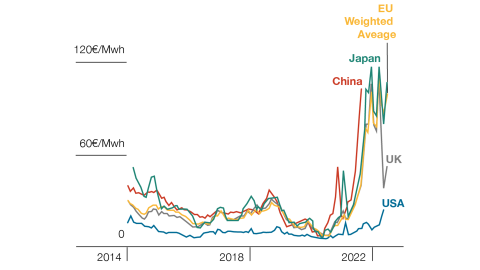
Note: MWh = megawatt hour.
1. Maximize American energy production.
America enjoys the benefits of abundant resources and a robust domestic energy industry. Thus, the country has largely inoculated itself against the geopolitical risks associated with energy supply disruptions. However, Washington has consistently failed to consider the full long-term implications of new energy regulations. All too often, dramatic shifts in US policy have constrained this key strategic asset.
Policymakers should accept that the world will run on hydrocarbons for decades. Progressive policies in Western Europe have not abrogated fossil fuel dependence, and emerging markets in the developing world are even further behind in the energy transition. According to international forecasts and the US Department of Energy, hydrocarbons will dominate energy mixes worldwide through 2050 (see figure 2).6
It is too early to restrain hydrocarbon production and bet solely on green energy alternatives. An all-of-the-above policy presents an opportunity for bipartisan agreement to ensure national and economic security for the US and its allies while addressing climate change through a responsible pathway to net zero.
2. Restore American credibility.
America is the world’s preferred energy supplier because the US produces cleaner, more competitive, and more reliable energy than most other countries. Meanwhile, export restrictions undermine US allies’ energy security. In 2022, 64 percent of US LNG exports went to Europe,8 which met only 10 percent of its natural gas needs through domestic production.9 The Biden administration’s decision to limit LNG exports directly undermines cooperation with Washington’s most important allies and goes against the very definition of energy security.
Figure 2. Global Primary Energy Consumption by Energy Source, 2010–50
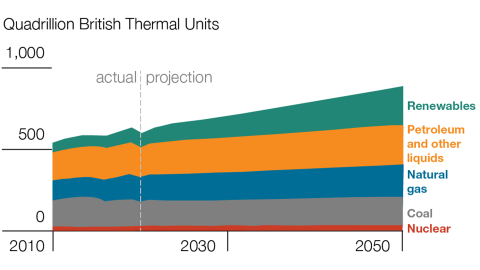
Note: “Petroleum and other liquids” includes biofuels.
America’s allies and its business community have expressed significant concerns. Japan, Europe, and the US Chamber of Commerce have all explicitly opposed the export ban, which appears to have been a unilateral move by the administration.10 Increasing the supply of LNG to US allies will lower prices and reduce their dependence on Russian LNG, therefore harming the Kremlin’s ability to wage war.
Conversely, these key allies could see export limits as an American strategy to use energy as a policy weapon in global trade. Policymakers should not manipulate regulatory processes for political reasons because such manipulation undermines regulatory certainty and deters investment. Washington should remember that questions about America’s credibility and reliability will push countries to look for other suppliers or revert to higher-emitting energy sources.
3. Create a stable policy environment.
Energy policies do not exist in isolation. Energy security demands a comprehensive commitment to maintaining a stable policy environment, along with technological innovation and cooperation among allies.
Thoughtful and sustained long-term capital investments in energy production, distribution infrastructure, storage, and research and development are necessary to create secure and resilient energy systems capable of providing the quantities and types of energy the US military needs, when and where it needs them. Additionally, the US and its allies need to invest in redundant facilities and supplies to account for plant outages or other unforeseeable circumstances like Russia’s energy warfare. These investments are only possible in a predictable and stable policy environment.
Figure 3. Net Additional Coal Plant Capacity since 2015 Paris Agreement
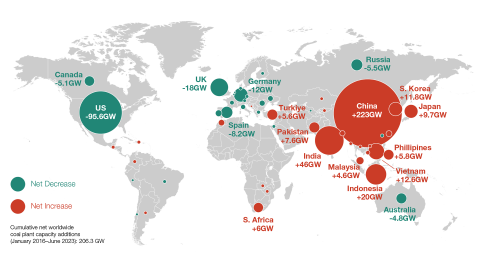
Note: GW = gigawatt.
Investment in renewables is also crucial for long-term decarbonization. However, policymakers should recognize the current limitations of renewable energy, such as intermittency and storage. Natural gas is, therefore, a necessary transition fuel. Suddenly changing the rules on natural gas exports is imprudent, and it imperils a successful energy transition. By introducing further uncertainty to the global energy market, Biden’s pause on LNG exports will harm global emissions-reduction efforts.
4. Recognize emissions realities.
Even the European Union recognizes that natural gas is essential for global decarbonization. As America’s experience in reducing emissions shows, switching from coal to natural gas is a significant step in the energy transition.11 The Environmental Protection Agency notes that from 2005 to 2020, US net emissions declined 21 percent in large part “due to an increasing shift to use of less CO2-intensive natural gas for generating electricity.”12
This fact is especially significant given the pace at which China and India increase emissions. China alone produces more emissions than the US and Europe combined. While China is adding large sums of renewables to its energy mix, it is also dramatically increasing its coal consumption. Overall, the country’s energy expansion involves an ever increasing carbon footprint, which means that China uses highly carbon-intensive processes to manufacture its products—including solar panels. Emission reductions by reducing coal in the United States, Europe, and Australia have resulted in a net increase of over 206 gigawatts elsewhere, as shown in figure 3.13 Similarly, figure 4 illustrates that the world has never used more energy at any point in human history.14
Figure 4. World Energy Consumption, 1820–2010
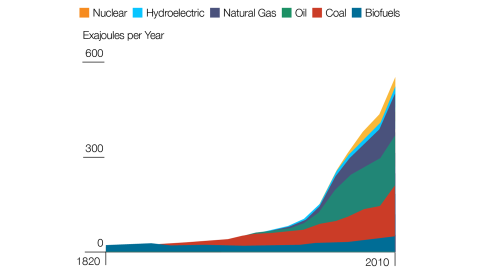
Limiting or removing American LNG while the world’s energy needs grow is counterproductive to emissions reduction. US-produced energy is arguably the world’s cleanest from a safety and emissions perspective, given that most other major natural gas producers abide by relatively few regulations.
In 2019, a Department of Energy laboratory found that countries importing LNG produce less greenhouse gas than those countries’ domestic coal options.17 Specifically, this study found that throughout its entire lifecycle, US LNG imported to Europe resulted in more than one-third less greenhouse gas emissions compared to local coal. Results were similar for Asia.18
There is no reason to believe that global energy needs will decline in the near future. Therefore, the US should acknowledge that LNG is one of the cleanest available options and support further production to reduce emissions.
The Risks of Export Restrictions
If the Biden administration follows through with its LNG export limits, it can expect one or more of the following scenarios to play out. First, countries will fulfill their natural gas needs from higher-emitting producers. Second, curtailing American LNG exports is a gift to cash-strapped Russia; Pravda recently agreed when it noted that Europeans will eventually have to return to buying Russian gas because they will have no other choice.20 Third, adversarial or unreliable nations like Iran may enter the LNG export market. (The South Pars / North Dome field, which Qatar shares with Iran, is the world’s largest natural gas field.) Fourth, former LNG importers will be forced to return to coal, oil, wood, and other higher-emitting fuel sources to replace natural gas.
Facing a dangerous geopolitical landscape, America cannot afford this risk. Single-issue policy decisions—for example, net-zero emissions—neglect the interdependency of domestic and foreign policy issues. Policymakers focused on such a goal often fail to consider long-term ramifications, leading to shortsighted policies.
Arguments that the export ban will not harm American and global energy security fall short. While the ban does not affect many proposed LNG projects, policymakers cannot avoid the reality that many, if not most, of these projects will never be built. It would be imprudent to rely on the sheer number of applications as many energy infrastructure projects never come to fruition. Moreover, bureaucratic delays mean that many of these proposed projects will have to reapply, as the seven-year permit clock would have expired.21
Figure 5. Life Cycle Greenhouse Gas Emissions for Natural Gas and Coal Power in Europe
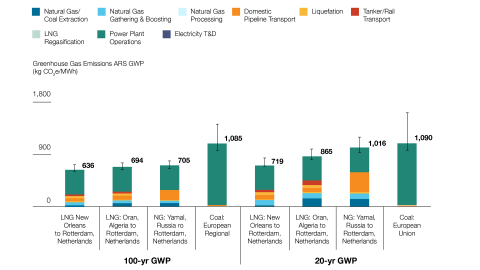
Note: GWP = global warming potential, GHG = greenhouse gas, NG = natural gas, kg = kilogram, e/MWh = emissions per megawatt hour, T&D = transport and distribution.
Similarly, some who support the export ban note that it has been several years since the United States has updated its process for approving new projects. They argue therefore that a new review is overdue, believing that a new review would only implicate new projects proposed beyond 2030. This misses the mark on two accounts. First, proposed projects can be speculative; not all will be built. Second, if the 2015 and 2019 studies are out of date for 2024, then the same logic would
apply to future permit applications. America would then be locked in a never-ending review cycle, which would indefinitely stall the building of vital new energy infrastructure.
How America Moves Forward
The administration should reconsider the broader impact of the LNG export ban in light of US foreign policy objectives, its national security, and the security of its allies. Washington typically seeks to avoid regulatory action until all relevant facts are known. The prudent course of action is to leave the permitting process untouched until the reviews are completed. The administration’s implementation of an export ban presupposes an outcome that is far from obvious, going against the intent of the permit systems and regulatory structures to which regulatory actions have to comport.22
Therefore, the administration should take four steps:
- Suspend the export ban until all studies are complete, peer-reviewed for accuracy, and submitted for public comment consistent with the Administrative Procedure Act.24
- Better define the parameters of any subsequent study to improve the approval process and give domestic energy suppliers more predictability.
- Solicit input from leading national security experts on the impact energy policy might have on America’s vital allies.
- Ensure that any study is fully transparent to avoid political interference, with each step well documented. The public has a right to ask for a complete understanding of the review’s size, timing, and scope in advance. Additionally, Congress should exercise its oversight of the Department of Energy to monitor and ensure that the department follows the law. Such oversight will help measure and grade both pace and compliance.
These recommendations will help level the regulatory playing field and create a transparent process for all parties involved. By learning from the past and adopting strong, stable energy policies, Washington can return to its place as the primary guarantor of global security and prosperity. Failing to do so only helps America’s adversaries.














